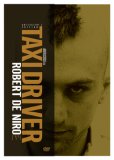| Reviews & Columns |
|
Reviews DVD TV on DVD Blu-ray 4K UHD International DVDs In Theaters Reviews by Studio Video Games Features Collector Series DVDs Easter Egg Database Interviews DVD Talk Radio Feature Articles Columns Anime Talk DVD Savant Horror DVDs The M.O.D. Squad Art House HD Talk Silent DVD
|
DVD Talk Forum |
|
|
| Resources |
|
DVD Price Search Customer Service #'s RCE Info Links |
|
Columns
|
|
|
Taxi Driver
NOTE: The top screenshots are from the 1999 single disc release DVD and the screenshots on the bottom are from the new two-disc collector's edition DVD release from 2007. They might not match up perfectly but they serve the purpose of showing the difference in quality between the two discs different releases. Not having access to the Japanese Superbit DVD release makes comparing the image on this new release to that transfer (which reportedly trumps the previous R1 release) impossible.
The camera closes in on an Alka Seltzer tab as it lands in the glass of water and bubbles up to the surface, frothy and manic. What was once simple, plain and quiet has, when coupled with a glass of water, exploded. Travis Bickle is the Alka Seltzer in the glass of water that is seventies New York City.
Martin Scorsese's Taxi Driver remains one of the finest cinematic achievements of the 1970s and even now, three decades plus since it was made, the film has lost none of its power or relevancy. If anything, given the current political climate of the United States at the time of this writing, the film is just as poignant now as it has ever been. Not only is the film an allegorical piece on the issues that those returning from military service may or may not have to deal with but it also remains an interesting portrait of a socially ostracized and dangerous human being, something we've unfortunately never had any shortage of in the 'real world.'
"I got some bad ideas in my head."
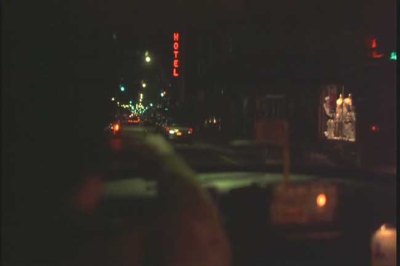
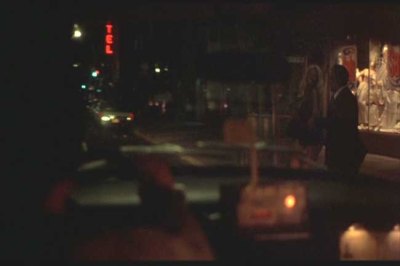
For the three of you out there who haven't seen Taxi Driver, Robert De Niro plays Travis Bickle, a Viet Nam vet living in New York City who takes a job driving a cab at night. Travis is a loner, he's out there a bit as far as social skills are concerned and he just doesn't relate to the masses. He also sees the New York City he lives and works in as a cesspool, a sewer full of the worst that humanity has to offer. His occupation does nothing but reinforce this for him, as he is routinely forced to deal with junkies, whores and assholes - it's all part of the job.
Things look up for Travis when, seemingly by chance, he meets a beautiful woman named Betsy (Cybill Shepherd long before Moonlighting) who works for presidential hopeful, Charles Palantine (Leonard Harris). He's instantly attracted to her but their courtship soon becomes sour when they can't relate to one another. After Travis takes her to a 42nd St. porno theater on a date, she decides she wants nothing to do with him and the screws start to come loose upstairs for our hero. Shortly after, he runs into an underage prostitute named Iris (a young Jodie Foster) and they develop a strange relationship. Travis, after learning of her plight, takes it upon himself to do what he can to clean up the seedy side of the city, and American Cinema forever changed.
"Thank God for the rain to wash the trash off the sidewalk."
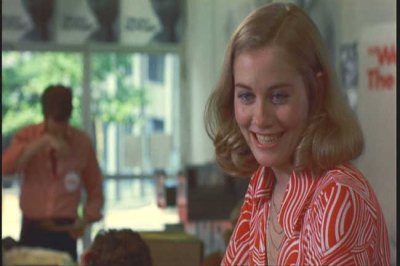
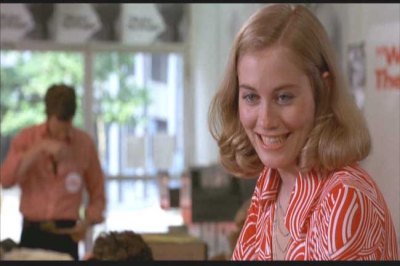
Mick Jagger once sang 'Go ahead, bite the Big Apple, don't mind the maggots.' Unfortunately not everyone can be as selective with their diet as Mick, and Taxi Driver is very much a movie for those people. Anyone who has ever spent a large portion of their time in the heart of an urban metropolis, be it New York, Chicago, Los Angeles, or even Toronto, has no doubt been witness to criminal activity. Whether it's drug dealing, prostitution or theft, crime and violence is to a certain extent a way of life in any major metropolitan area. De Niro, as Travis Bickle, represents that side of us that gets fed up with things. Granted, he's far from healthy - he is quite insane when it all comes down to it - but part of what gives Taxi Driver its power is that Travis Bickle lies inside so many normal, every day citizens.
Bickle is far from a model citizen. His obsession with pornography is probably quite unhealthy and it could very well be part of the reason he's unable to relate to women on what many of us would consider a normal level. He's obviously got a bit of a temper, which we see erupt by the time that the film finishes and there are moments in the film where it's made perfectly clear to us that Travis just 'doesn't get it' as far as other people are concerned. That said, despite what happens in the last twenty-minutes of the picture, is he really the bad guy? Is Travis completely at fault for what happens or is society? Has he been pushed too far? Is he a complete psychopath or, as he says, is he simply someone who stood up?
"Loneliness has followed me my whole life, everywhere. In bars, in cars, sidewalks, stores, everywhere. There's no escape. I'm God's lonely man."
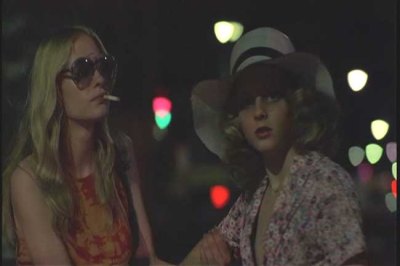
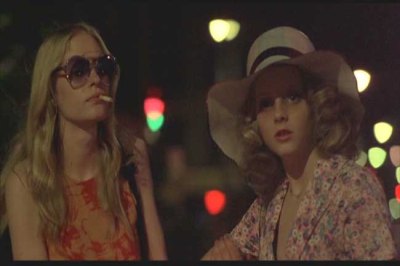
One of the most remarkable aspects of the picture is how completely alienated Scorsese and writer Paul Schrader were able to make De Niro's Bickle. While De Niro no doubt deserves much of the credit for his portrayal of the character, Scorsese was the one who ensured that the picture was cut the way that it was cut and who did such a phenomenal job of surrounding Bickle with the lowest of the low, the worst that society had to offer. As such, while we may not necessarily agree with Bickle's philosophy or his methods, we can at least to a certain extent understand why he does what he does, particularly after he meets Iris even if their introduction is under rather unusual circumstances.
Schrader, on the other hand, infuses so much of himself and where he was at during a certain point in his life that Bickle is, frighteningly enough, an extension of himself as he is anything else. What makes the character and the circumstances so believable is the fact that so many of us have been there - who hasn't had their heart broken? Who hasn't been attracted and subsequently dismissed by someone who just didn't click? We don't always choose the people in life that we meet, nor do we choose whom we're attracted to. Genetics and biology play a large part in that, a much bigger part than free will does. Can we blame Travis for falling for Betsy? She is quite beautiful, she's interesting and smart and funny and charming. Is it his fault that he's completely incompatible with her? Or is it simply fate, one of life's many injustices?
"Each night when I return the cab to the garage, I have to clean the cum off the back seat. Some nights, I clean off the blood. "
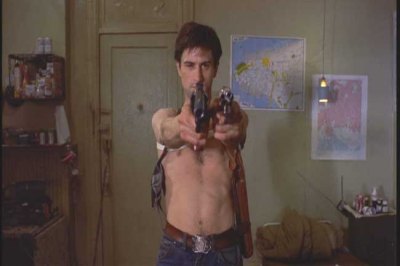
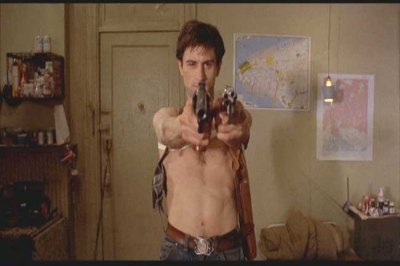
That said, as deeply personal as the script is and as very much infused with the pissed off enthusiasm of a young Scorsese the film is, De Niro (fresh off of his Academy Award winning performance from The Godfather II) really does make Travis Bickle the instantly recognizable cinematic icon that he is. According to Schrader, a few of the more infamous scenes, the mirror speech for example, where at least partially improvised by De Niro during the production and while he may have gone on to garbage like Meet The Fockers he will always deserve our respect and admiration for the challenging roles that made him the respected actor that he is, Taxi Driver being up there alongside other Scorsese collaborations such as Raging Bull, Mean Streets, Goodfellas and Casino.
On top of the absorbing script, the stellar lead performance and the tense and precise direction is the cinematography courtesy of director of photography Michael Chapman. The man has done everything from Michael Jackson videos to Scorsese films to Steve Martin comedies but Taxi Driver remains such a perfectly photographed picture that it's hard to imagine that this is not the film he'll be forever remembered for (and yes, in terms of cinematography, Taxi Driver is above Raging Bull which Chapman also shot). It's been said, and rightfully so, that New York City is as important a character in the film as any of the people who show up in front of the camera and that's very true. Chapman more or less just let his camera go, capturing the reality of the New York of the era, and as such what we're left with is a very realistic feeling picture that gives us a fly-on-the-wall look at the flat out scuzziness of the area where Bickle works his beat. This, in turn, makes Bickle's inevitable downward spiral all the more understandable.
"One of these days I gotta get myself organizized."
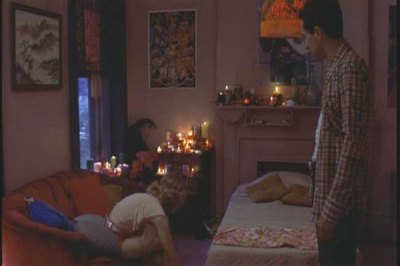
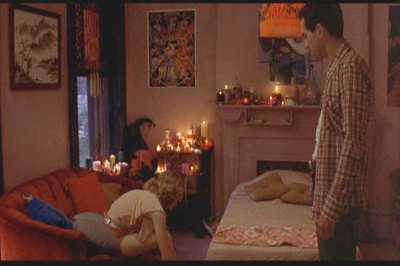
With big names like De Niro, Scorsese and Schrader dominating the credits, it would be easy to look past the supporting cast that makes Taxi Driver the masterpiece that it is. Cybill Shepherd is absolutely beautiful as Betsy, she's as charming as she should be and her character exudes a certain unattainable sexiness that someone like Travis Bickle will never be able to acquire, lending her character enough unattainable sex appeal to work. It's obvious that Travis and Betsey are from two very different worlds, and it's even more obvious that despite his best intentions, they don't have a chance at making it work despite her honest intentions at the beginning of their brief relationship. Throw the smart-ass Tom, as played perfectly by the smug Albert Brooks, into the mix and you can see that when Bickle tries to enter Betsey's world he's really just jumping into a deep end he'll never be able to swim out of. Travis' knowledge of politics and world events is blunt (see the quote below) and far too obvious for the politicos he's found himself interacting with to ever really understand. He represents the every man while they represent an administration more interested in conquest than problem solving.
Other supporting actors - like the late, great Peter Boyle, who plays Wizard, and even director Scorsese himself, who plays the disgruntled husband with the gun in the back of Bickle's cab - all deserve credit for joining together to assemble a fantastic cast of bit part players who simply add to the realistic nihilism of the film. Harvey Keitel, as Iris' pimp, Sport, stands out in his all too brief appearance while Foster turns in a fantastic and freakishly believable turn as the underage hooker who changes Bickle's stance on action versus complacency.
"I think someone should just take this city and just... just flush it down the fuckin' toilet."
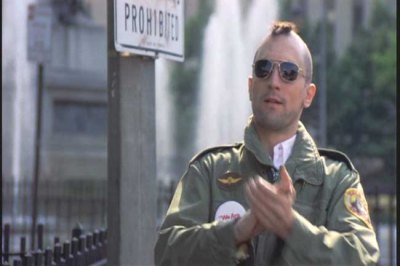
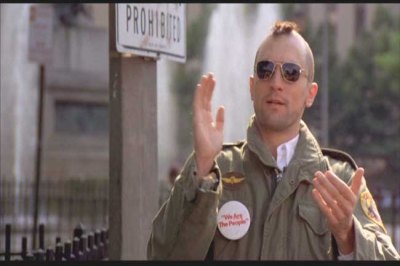
Last but not least, mention needs to be made of Bernard Herrmann's completely eerie score. The instrumental parts of the picture that fade in and out over various aspects of Bickle's story add an otherworldly tone to the picture. The music not only accentuates the more poignant aspects of the film as any good soundtrack should, but it also enhances the opening sequence and sets the tone right from the get-go.
More than three decades since it was made, Taxi Driver remains one of the most powerful and important pieces of filmed art to emerge out of American cinema of the 1970s. Its impact is still felt, the people who worked on it have gone on to become some of the most respected filmmakers in the land, and most importantly the film still packs one hell of a punch. New York might have been sanitized since the film was made but the story could easily be transplanted to whatever part of the world where there is strife and social unrest that you'd care to name. As such, the story remains timeless and the film still hits you like a punch in the gut. Odds are, that will never change making the picture as important and justifiably pissed off now and in the future as it ever has been.
The DVD Video:
Taxi Driver has always been a very dark, gritty and grainy looking film and as such the newly restored 1.85.1 anamorphic widescreen (which has been re-mastered in high definition - can the Blu-Ray release be that far off?) transfer on this release might irk some viewers as the first thing you'll notice is that the picture is noticeably brighter than the past DVD. While some might consider that a strike against a bleak urban noir-inspired picture such as this, with the increased brightness we also get considerably more detail and noticeably improved color reproduction. Flesh tones look very realistic and lifelike and the black levels are noticeably more solid and less murky than they have been in the past. The ever-important reds look quite good here, you'll notice during the finale that the blood looks more realistic than in the past. As far as the grain goes, the picture has been cleaned up a bit but it's still a very film-like presentation and the grain, which definitely gives the movie part of its 'look' is definitely still there. Aside from the grain there's very little print damage to complain about and there aren't any problems with heavy mpeg compression artifacts or obvious edge enhancement. One aspect that should be noted is that there does look to be just a bit more picture on top and a bit less on the bottom of the frame, indicating that this new release might be framed just a tad differently - it's very minor, but it's there. The opening scene is still a bit sludgy looking, as it's always been, but it definitely doesn't look as blotchy as the last Region 1 DVD release did.
"Listen, you fuckers, you screwheads. Here is a man who would not take it anymore. A man who stood up against the scum, the cunts, the dogs, the filth, the shit. Here is a man who stood up."
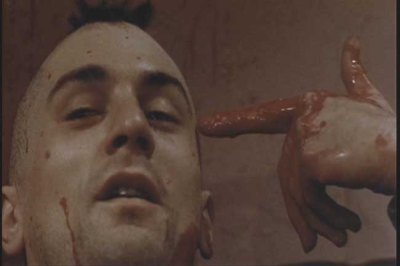
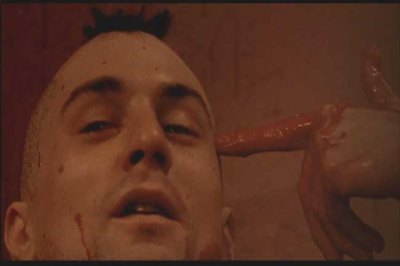
There are two audio options provided for the film on this release - English and French Dolby Digital 5.1 Surround Sound. Optional subtitles are provided in English, French and Spanish and closed captioning is provided for the feature in English only. It would have been nice to have a 2.0 track included but at least the 5.1 track sounds fairly true to how the movie is supposed to sound. The score has a really nice sound to it, as it's just abrasive enough to be effective without overpowering things. Dialogue is clean and clear and free of any hiss or distortion at all. No DTS option is provided unfortunately but as far as surround usage and rear channel action goes, this is a fairly front heavy mix with the surround used primarily for ambient noise and certain parts of the score. As such, it doesn't feel too contrived or forced. In short, it sounds like Taxi Driver.
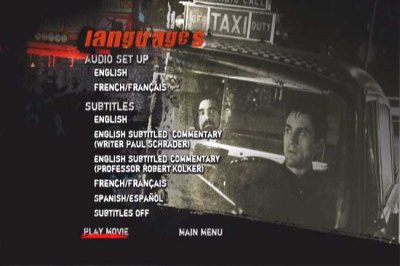
NOTE: Subtitles are provided in English, Japanese, Portuguese, and Korean for the extra features.
Where this new two-disc release really excels is in the extra features department. First up is a brand new audio commentary track with writer Paul Schrader. Schrader starts off by explaining the Chemtone process used in the beginning and the end of the film, explaining that this was done intentionally to give the impression that the film is a loop, ending where it begins. From there he explains where the inspiration for the film came from, details some inaccuracies in his screenplay that Scorsese corrected such as street names and cab colors, and he explains the problems that they had getting the movie financed. Schrader also explains some alterations that were made to the script to appease the studio that was worried about his original script, which had Keitel's character and all the people killed in the brothel, originally intended to be black. In addition to giving an absolutely fascinating history lesson about the genesis of the film, Schrader also points out subtleties and minute details about Bickle and a few other characters, explaining why some of the quirks are there. A good example of this is how Schrader points out during the scene in which Scorsese appears in the back of the cab and talks about killing his wife, that Scorsese's character isn't the dangerous one as he's the one talking about it and letting it out. Bickle, on the other hand, feels the same way yet bottles it up, meaning that he's going to be the one that snaps. Along the way he also points out scenes that were improvised, discusses the making of the 'gun glide' in a fair bit of detail and where the idea came from, and he discusses how he got into screen-writing as self therapy. There's a bit of dead air here and there and a few stretches where Schrader clams up a bit, but with that said, this is a very interesting track that is completely worth listening to from start to finish. It's not only a nice historical account of how a very important film was made but also a revealing look into the mind of the man who came up with the story in the first place.
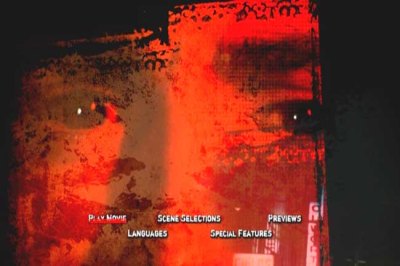
A second brand new audio commentary track is also provided, this time courtesy of Professor Robert Kolker. This track is very different from the first one, it's considerably more critical in that it dissects the film and explains a lot of the symbolism and details. Kolker explains why certain techniques were used in the film (notice how in certain scenes Travis is always shown alone in the frame?), details the visual and emotional darkness that permeates the film, and talks to the importance of the city in the film as a character rather than just a location. He talks about the differences between the diary that Travis keeps versus Travis' internal dialogues and his conversations with the people he interacts with. He elaborates on the importance of Scorsese's style and the impact that it had on the film, and how the discussion that Betsy has with Travis about Kris Kristofferson represents the disconnect he has from the world around him and how by taking Betsy to a 'movie' Travis is trying to pull her into his world, represented by the confines of his cab. He points out how Travis' paranoia can be seen in his interaction with others and his reactions which become increasingly extreme, represented by red lighting and odd camera angles. He points out the importance of Wizard's character which is a contrast to Bickle's extremes, and he points out the cyclical nature of the film through the introduction of Betsy and then of Iris. The end result is an excellent critical and observational discussion wherein Kolker delves deep into aspects of the film that aren't so obvious on the surface. Kolker also does a great job of pointing out some interesting comparisons to the cinema of Hitchcock and Ford. It's a fairly deep track and as such is quite rewarding - even if you've seen the film countless times, as many of us have, it's still a very interesting lecture that will likely point out things you may not have noticed before.
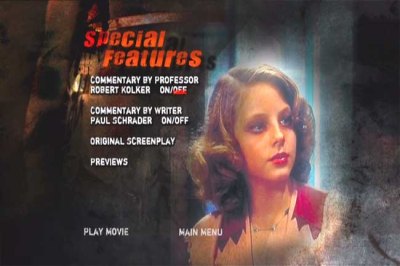
Rounding out the extra features on the first disc are trailers for nine other completely unrelated DVDs available through Sony and the original shooting script which is presented in such a way that it's chopped up to fit the film and match the scenes in the movie. This allows viewers to check out the script, then press the appropriate menu button and check out the scene as it appears in the film. Aside from some basic changes to the menu design, this feature is identical to the one found on the previous DVD release in region one.
The rest of the supplements are found on the second disc (and thankfully all of them except for Making Taxi Driver are presented in anamorphic widescreen), beginning with a wealth of featurettes. Here's a peek...
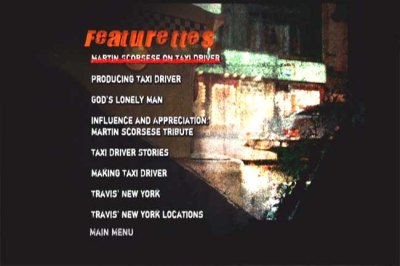
Martin Scorsese On Taxi Driver (16:50): This segment allows Scorsese to sit down and chat to the camera about how the film is one that comes from the heart and various regards. He gives Schrader a lot of credit for the movie's success, and he talks about how it was difficult to get a studio behind the film and about casting the film. Scorsese explains that he and Schrader didn't really expect the film to find any critical or financial success and how they made it simply because they had to. Scorsese then explains how and why the film is a product of its time, he details the hallucinatory aspects of Travis Bickle's experiences and mindset, and what genre he feels the film comes out of and how the film noir genre had a huge influence on him.
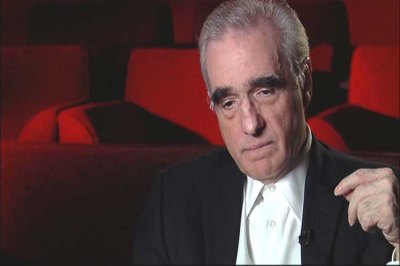
Producing Taxi Driver (9:51): This featurette is an interview with producer Michael Phillips who talks about how after getting out of law school he got into producing after learning about how many people coming out of film school couldn't find anyone to read their scripts. He talks about how he got on board with The Sting and how the lackluster box office of the sixties lead to having some new blood let in to the Hollywood system. From there he talks about how he was brought on board as the producer for Taxi Driver, what he likes about the film, what he likes about the lead character and what it was like working as a producer with the various cast and crew members attached to this project. He explains the negative response the pitch got at a few studios, and how scheduling problems lead to difficulties. Phillips is an interesting interview subject as he gives us a sort of 'top down' look at the production which provides a different slant on the history of the film than what we hear from other subjects.
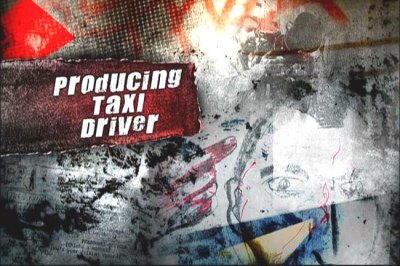
God's Lonely Man (21:40): The first half of this third featurette is an interview with Paul Schrader that begins by explaining how the Travis Bickle character forces himself into isolation and brings his loneliness upon himself by his actions. From there, Schrader explains how his religious upbringing prevented him from seeing much film at all until he was older and how from there his life changed in a big way. He left the AFI, his marriage fell apart, and he became very disillusioned. It was then that he wrote Taxi Driver. Schrader covers some of the same ground here as he does in the commentary track but it's still interesting to hear him refer to the cab as a metal coffin for Bickle's character and explain some of the deeper meaning of the film. From there we hear from Professor Robert Kolker who dissects various aspects of Schrader's script and applies them to the work of Scorsese and the character of Travis Bickle. The interviews cut back and forth between the two participants and plenty of clips illustrate various points making this a thorough and interesting examination of why Travis Bickle is such an interesting and frightening character.
Influence And Appreciation: Martin Scorsese Tribute (18:29): Oliver Stone, Paul Schrader, Michael Chapman Roger Corman, Michael Phillips, Robert De Niro, and Professor Robert Kolker all explain their relationships and appreciation of Martin Scorsese. Chapman and Stone talk about their film school years and how that put them on the same page where as De Niro gushes over the man's encyclopedic knowledge of film. Corman explains how Scorsese learned early on how important it is to be prepared and how that made him a better director, and Phillips discusses how with Taxi Driver Scorsese, in a sense, 'gave us New York.'
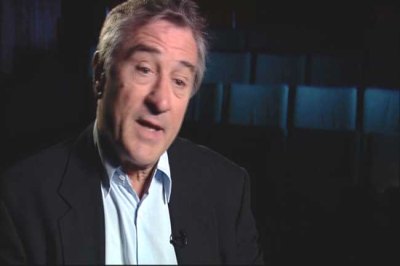
Taxi Driver Stories (22:08): One of the most surprisingly good featurettes on this release is this segment which simply lets a few different men who lived and drove cabs in seventies New York tell some odd stories. Obviously Times Square is a very different animal than it was when Taxi Driver was made and it was considerably more dangerous to drive a cab then than it is now that it's been homogenized. These guys explain the reality of working as a cab driver and then from there we learn about the changes that have taken place in the cab driving industry over the years. We learn about pay structures, benefits, how to make a living as a driver and equally as important why people chose to make a living as a cabbie. Ed Koch even shows up and explains the cultural importance of the NYC cabbie and the myth surrounding them.
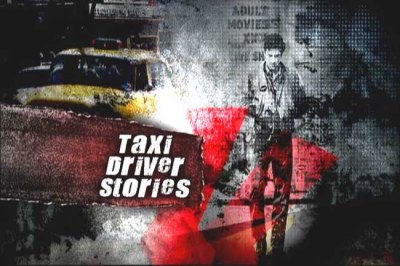
Making Taxi Driver (1:10:51): This is the same fantastic documentary that appeared on the last DVD and Sony was wise to carry it over (it's also the only non-anamorphic supplement in the set). Made in 1999 by director Laurent Bouzereau, this seventy-one minute piece features interviews with Scorsese, De Niro, Shepherd, Foster, Brooks, Keitel, Schrader, Boyle and more. It's a pretty thorough examination of the production with Scorsese giving some excellent background information on how he came to helm the project and with Schrader lending some insight into how and why he came to write the script in the first place.
Travis' New York (6:14): Director of Photography Michael Chapman explains how Taxi Driver is interesting not only as a fictional movie but also as a documentary about what New York City was like in the seventies. Ed Koch explains what Times Square was like when he first came into office and the impact of pornography on the area. Chapman talks about the plethora of movie theaters that were there in the 50s, and how it's a crime how Times Square has become Disney-fied. Koch defends his administration's plan to clean up the area, and how Dinkins got the leases signed with Disney and how Giuliani cleaned up so many of the porno shops.
Travis' New York Locations (4:24): This segment allows you to check out nine locations from the movie as they appear in the film and as they appear today through the magic of some side by side split-screen camera work - The Cab Office, Palantine Office, Columbus Circle, St. Regis Hotel, Porno Theater, 226 13th Street, Final Bloodbath, 13th Street, Belmore Cafeteria. You can check out each location on its own or use a 'play all' feature to watch them all at once.
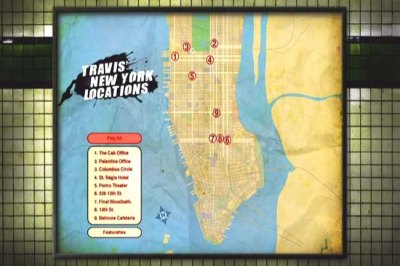
Once the featurettes are over with, it's time to move on to the storyboards starting with an Introduction By Martin Scorsese (4:32) who talks about how as a kid with asthma he got into drawing. From there he talks about the storyboarding process, and why it is so important to him as a director to have quality storyboards to use as a basis for the production. As he talks, we see stills of the storyboards that illustrate his point and he does a fine job of explaining not only the importance of the storyboarding process but also why it is so essential to his style of filmmaking.
As far as the Storyboard To Film Comparisons (8:19) themselves go, they play out in such a way that both the storyboard image and the filmed sequence are on the screen at the same time. This allows us to see the similarities and the differences between the two versions of the story and it's actually pretty interesting. While obviously at 8:19 in length we don't get the entire film we do get most of the key scenes with the final shoot out and resulting aftermath being the highlight here as the illustrations on the storyboards for these bits are rather crazed and as such pretty interesting to see.
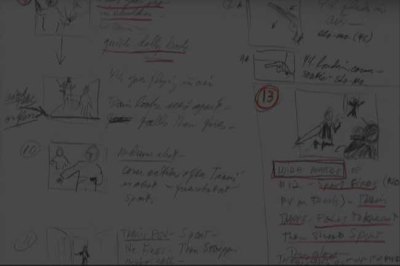
Closing out the second disc is a series of still galleries: Bernard Herrmann Score (images of Herman's written music set to the main theme, 2:22), On Location (thirty-seven black and white photos shot during the production set to music from the film, 2:52), Publicity Materials (twenty-one images of one-sheets and promotional pictures set to music, 1:43) and Scorsese At Work (approximately thirty black and white images from the shoot showcasing the director at work set to music, 2:45).
Completists may want to know that the liner notes that were found inside the case for the previous Taxi Driver release are not included with this new two-disc set. More importantly, the original theatrical trailer (which is a great trailer...) for the film is nowhere to be found. Two minor reasons that fans might want to hold onto the last disc, and two small nit picks that keep this disc from scoring perfect marks in the extras department. Also worth noting is that the commentary which appeared on the Criterion laserdisc release has not been ported over, and neither has the option to watch the film with its isolated score.
Final Thoughts:While it would have been nice to see the extras from the Criterion laserdisc show up, and the omission of the trailer and the liners is certainly an annoyance, the new extras compiled for this new two-disc set are extensive and quite fascinating. The new transfer might irk some with its noticeable brightness but it is definitely a clearer and more colorful picture with more depth and more detail to it. The 5.1 audio sounds great even if the original track should have been included. The small complaints keep this from being the definitive presentation but there's certainly enough going for it that this new Collector's Edition of Taxi Driver comes highly recommended.
Ian lives in NYC with his wife where he writes for DVD Talk, runs Rock! Shock! Pop!. He likes NYC a lot, even if it is expensive and loud.
|
| Popular Reviews |
| Sponsored Links |
|
|
| Sponsored Links |
|
|
| Release List | Reviews | Shop | Newsletter | Forum | DVD Giveaways | Blu-Ray | Advertise |
|
Copyright 2024 DVDTalk.com All Rights Reserved. Legal Info, Privacy Policy, Terms of Use,
Manage Preferences,
Your Privacy Choices | |||||||









